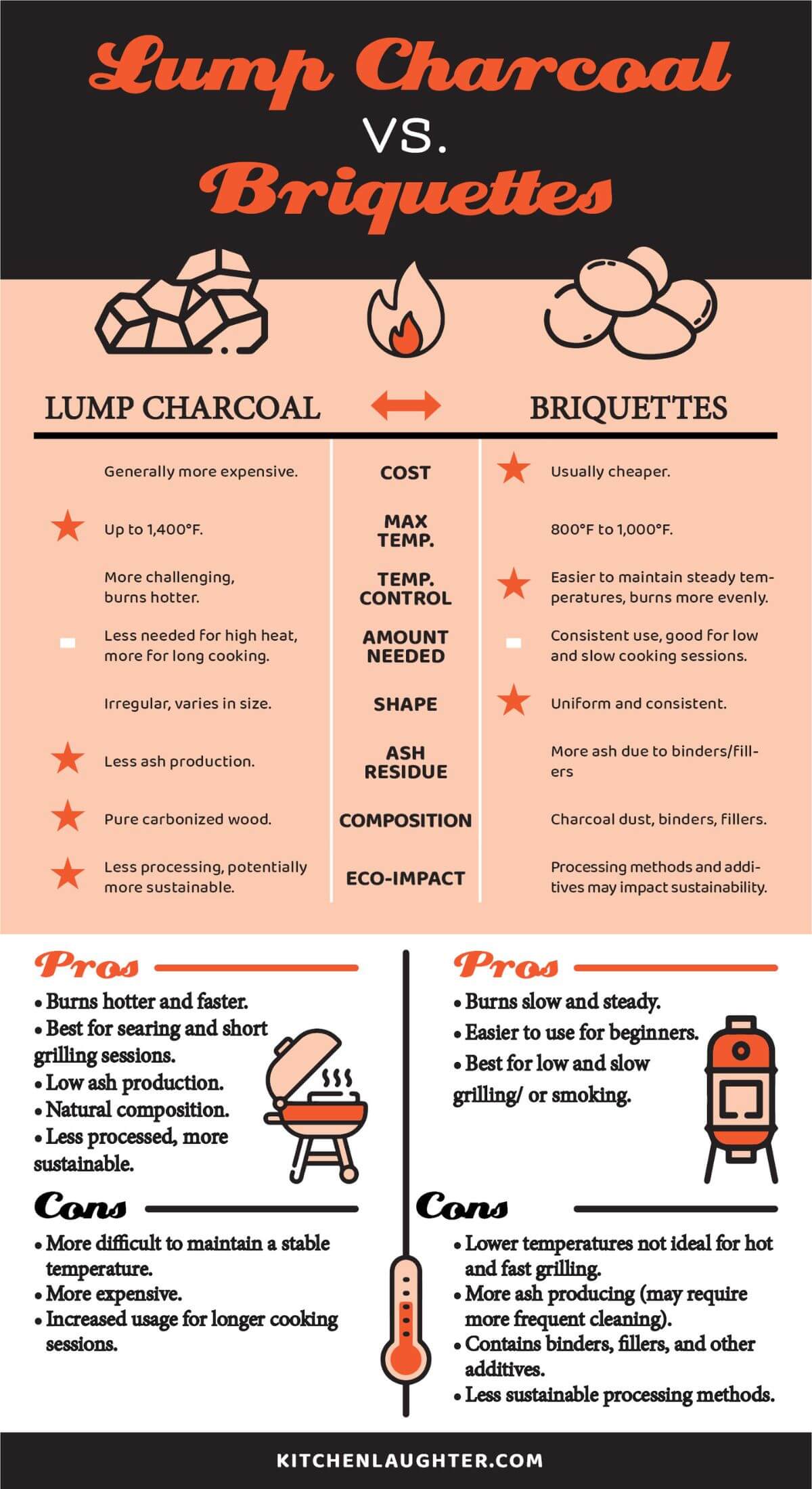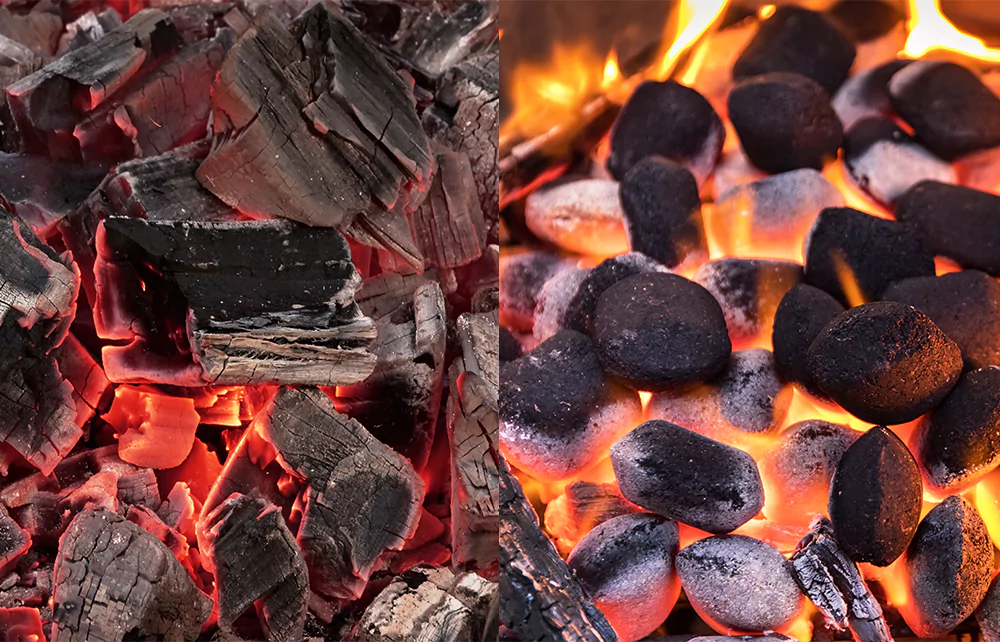Charcoal vs. Briquettes: Which Fuel is Right for Your BBQ?
This guide dives deep into the charcoal vs. briquettes world, exploring everything from their origins to their unique advantages. We'll arm you with the knowledge you need to pick the perfect fuel for your next BBQ, helping you unlock the full potential of your grill.
1. The Genesis: Where Charcoal and Briquettes Come From
Charcoal: Imagine a tree transformed into a black, porous mass. That, in essence, is charcoal. Made by heating wood in a low-oxygen environment, this process removes most of the water and volatile compounds, leaving behind a concentrated fuel source. Lump charcoal, the most popular type, is made from pure wood, resulting in a hotter, more flavorful burn.
Briquettes: These are the "engineered" charcoal. They're crafted by binding together sawdust, coal dust, and other byproducts with a binder (often starch or clay). This process produces a consistent, uniform shape, making them easier to handle and store.
2. Performance: A Head-to-Head Comparison
:max_bytes(150000):strip_icc()/__opt__aboutcom__coeus__resources__content_migration__serious_eats__seriouseats.com__images__20080520-charcoal-f1a9d91441cd44a98c111486e254e8a0.jpg)

2.1 Heat & Burn Time:
- Charcoal: Lump charcoal burns hotter and faster than briquettes. Expect a quicker heat-up time and a more intense flame. It's a great choice for high-heat grilling, like searing steaks or grilling vegetables.
- Briquettes: Briquettes burn longer and more consistently than lump charcoal. They're known for their even heat distribution and their ability to maintain a stable temperature for extended periods. This makes them perfect for slow and low cooking methods like smoking meats.
2.2 Flavor:
- Charcoal: Lump charcoal provides a more natural, pure wood flavor. You're essentially getting the taste of the wood itself.
- Briquettes: While they can still deliver a smoky flavor, briquettes often have a slightly artificial taste due to the binders used in their production.
2.3 Ash Production:

- Charcoal: Lump charcoal produces less ash than briquettes, making it a cleaner option.
- Briquettes: Briquettes, due to the binder ingredients, tend to create more ash, requiring more frequent cleaning of your grill.
3. Practical Considerations:
3.1 Price & Availability:

- Charcoal: Lump charcoal is generally more expensive than briquettes. However, it offers greater value in terms of its burn time and superior flavor.
- Briquettes: Briquettes are readily available at most grocery stores and home improvement centers, making them a convenient option.
3.2 Handling & Storage:
- Charcoal: Lump charcoal is typically irregular in shape and can be messy to handle.
- Briquettes: Briquettes are easier to store and handle due to their consistent shape and size.
4. BBQ Charcoal: Your Go-to Guide for Grilling Success
4.1 Choosing the Right Charcoal:
When selecting your BBQ charcoal, consider these factors:
- Type of Cooking: Are you grilling steaks, smoking ribs, or baking pizza? This will influence the heat and burn time you need.
- Flavor Preference: Do you want a pure wood flavor or are you okay with a slightly more artificial taste?
- Budget: Briquettes are a cost-effective option, while lump charcoal offers a premium grilling experience.
4.2 Charcoal BBQ Tips for Beginners:
- Start Slow: Avoid piling too much charcoal at the start. A small amount will be sufficient to get your grill going.
- Even Distribution: Spread the charcoal evenly across the bottom of your grill for consistent heat.
- Create Zones: Use the charcoal layout to control the heat distribution. A hot zone for searing and a cooler zone for low and slow cooking.
- Don't Overfill the Grill: Leave enough space between the coals and your food to allow for proper air circulation.
- Use a Chimney Starter: This handy tool makes lighting charcoal a breeze, ensuring an even and quick heat-up.
5. Common Misconceptions Debunked:
- Myth: All briquettes are the same. Not true! Different brands use varying binder types and wood sources, resulting in varying flavors and performance.
- Myth: Lump charcoal is always better. Not necessarily. Briquettes can be an excellent choice for certain cooking methods, especially those requiring longer cook times.
6. Real-World Examples:
- Steak Lovers: For a perfect sear, use lump charcoal for its intense heat and ability to reach high temperatures quickly.
- BBQ Enthusiasts: Briquettes are your go-to for smoking meats. Their consistent heat and long burn time ensure optimal results.
- Weekend Warriors: If you're a casual griller, briquettes offer convenience and affordability.
- Gourmet Grilling: For a truly elevated grilling experience, opt for lump charcoal and experiment with different wood varieties for unique flavor profiles.
7. Conclusion: Which Fuel Reigns Supreme?
The charcoal vs. briquettes debate ultimately comes down to personal preference and the specific needs of your grilling style. Both fuels offer distinct benefits and cater to different cooking methods.
Call to Action:
Now that you're armed with this comprehensive guide, it's time to pick your weapon and unleash your grilling prowess! Whether you choose the fiery passion of lump charcoal or the consistent reliability of briquettes, remember to experiment and find what works best for you.
Happy grilling!
QnA
Q: Charcoal briquettes vs. lump charcoal? : r/grillingA: Jun 16, 2022 ... I grew up using briquettes and never paid any attention to anything else. I've been wondering the real difference between them, if any at all.
Q: Grilling Smackdown: Lump Charcoal vs. Briquettes
A: Unlike the pure lump charcoal, briquettes are manufactured wood by-products compressed with additives that help them light and burn consistently. These ...
Q: What are the major differences between briquettes and charcoal? : r ...
A: Apr 17, 2019 ... Briquettes are basically charcoal made with sawdust (possibly with binders) and lump is charcoal made from whole pieces of wood.
Q: What is the difference between charcoal, briquettes, and lump wood ...
A: Apr 27, 2023 ... Briquette charcoal is sawdust that has been chopped up, put in a slurry, then compressed into the briquette form and burned until dry. Lump ...
Q: Lump Charcoal vs Briquettes - What the Experts Say - Smoked BBQ ...
A: Briquettes are made from sawdust and leftover woods that are burnt down the same way as lump charcoal. Unlike lump charcoal, additives are in the process of ...
Q: Certified Lump Charcoal vs Briquette Charcoal - Char-Griller
A: The difference between lump charcoal and briquettes is, lump charcoal is the actual wood from the tree is all natural wood carbonized with no chemicals added ...
Q: Briquettes vs lump charcoal | Smoking Meat Forums - The Best ...
A: Aug 14, 2020 ... biggest difference between briquettes and lump charcoal is that you don't have to wait for the lump to ash over, you can start as soon as they ...
Q: What's the Difference Between Briquette Charcoal and Lump ...
A: The briquettes burned very smoky versus the lumps. The lumps started faster and the flames from the lumps burned clean.
Q: The Difference Between Lump And Briquette Charcoal | Better Wood ...
A: Lump charcoal is great for hotter and faster grilling, not to mention kamado ceramic grills. Briquettes are good all round options for casual backyard grilling ...
Q: What's The Difference - BBQ Lump Charcoal Or Briquettes ...
A: Lump coal will burn hotter but quicker than briquettes, so the burn time is shorter. Ensure you get lump charcoal double-sieved, so you're not paying for ...